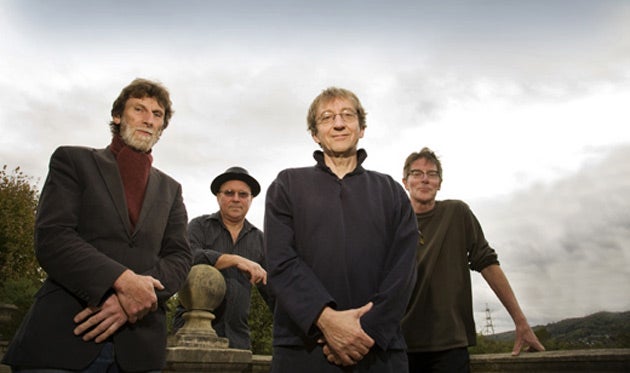Stackridge, 100 Club, London

Back in the early 1970s Stackridge were what the more discerning listener moved on to when they had finished with Lindisfarne. Like the Geordie folk-rockers, Stackridge had an air of feisty provincialism – they emerged from the Bath/Bristol area – and were not lacking in fiddles and flutes. But they were less earnest and more whimsical.
Packing great tunes and brimming with musicianship, they were also quite Beatley at a time when that kind of sound could hardly have been less fashionable, which may explain why they never got the credit they deserved. One of their albums was even produced by George Martin, but few people were aware of it.
Stackridge disappeared without ever having really arrived, cruelly overlooked by those whose heads were being turned by glam rock, prog rock and then punk rock. And that, it seemed, was that. But no. There was a brief, partial reunion in the late 1990s, and then, a couple of years ago, a more substantive one took shape, comprising all four original members, plus a few additional ones. But could they reach out to new audiences? Or would their appeal be confined to those of us with fond memories from the first time around?
A 100 Club crowd that comprised mostly fiftysomething males suggested that Stackridge had not yet moved beyond their core fanbase, but on the strength of a fine new album, they definitely deserve to – A Victory for Common Sense applying a very 2009 slickness to the thing that they always did well, which was write excellent songs.
In a way Stackridge's problem was deciding whether they were a vaudeville act or one that could have developed into our own REM, and this tension made for a rather uneven show. The larky figure of Mutter Slater hammed things up on "The Galloping Gaucho", and the band crooned their way through the Flanders and Swann number "Slow Train", before James Warren and Andy Davis raised the tone with the sublime 1980 hit they penned as the Korgis, "Everybody's Got To Learn Some Time" (much covered thereafter).
The Graham Nash-like figure of Davis was to the fore in the terrific newer material, notably the mid-tempo, harmonically rich "Long Dark River", into which a lifetime's experience seemed to have been poured. If Stackridge are to have a proper afterlife, that's probably the direction they need to go in.
Join our commenting forum
Join thought-provoking conversations, follow other Independent readers and see their replies
Comments
Bookmark popover
Removed from bookmarks